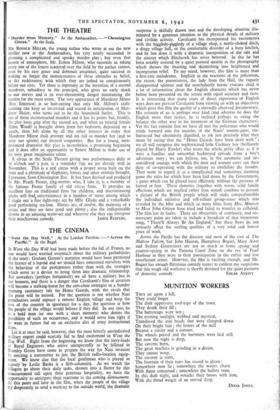THE CINEMA
IF Went the Day Well had been made before the fall of France, no one would have worried overmuch about the military probabilities
of the story : Graham Greene's narrative would have been permitted the licence of a legend and we should have concerned ourselves with the behaviour of the protagonists rather than with the strategies which serve as a device to bring them into dramatic relationship. But nowadays (perhaps fortunately) we all have a military bee in our bonnets, and there is a danger that Cavalcanti's film of invasion will become a stalking-horse for the arm-chair strategist or a Sunday morning cautionary tale for Home Guards, with the result that the point will be missed. For the question is not whether Nazi parachutists could capture a remote English village and keep the rest of the country in ignorance for a day, the question is how the people of the village would behave if they did. In any case, he is a bold man (or one with a short memory) who denies the possibility of such an occurrence, and it would serve him right if he were in future fed on an exclusive diet of army instructional films.
Let it at once be said, however, that the most bitterly unvindicated military wpm could scarcely fail to find excitement in Went the Day Well. Right from the beginning we know that the lorry-loads of Royal Engineers who arrive unexpectedly to be billeted in Bramiey Green have come to prepare the way for Nazi invasion by erecting a transmitter to jam the British radio-location equip- ment. We know also that the local gentleman who is played so suavely by Leslie Banks is a fifth-columnist. As we watch the villagers go about their daily tasks, thrown into a flutter by this unaccustomed call upon their generous hospitality, we have the opportunity to anticipate their reactions to the coming denouement. At this point and later in the film, when the people of the village try desperately to send a warn:ng to the outside world, the dramatic suspense is skilfully drawn taut and the developing situation illu- minated by a generous attention to the physical details of military and civilian activity. Cavalcanti has incorporated his excitements with the higgledy-piggledy of a village shop, a nettle-choked ditch, a dingy village hall, or the comfortable disorder of a busy kitchen, and he has done it with a dramatic juxtaposition of the safe and the sinister which Hitchcock has never bettered. In this he has been notably assisted by a quiet pastoral quality in the photography which throws the shooting and skirmishing into heightened and incongruous relief. To my mind, however, this film is more than a first-rate melodrama. Implicit in the reactions of the policeman, the rector, the postmistress, the lady from the Hall, the vaguely disappointed spinster and the nonchalantly heroic evacuee child is a lot of information about the English character which has never before been presented on the screen with equal accuracy and taste. It is interesting that many years of direct experience of English ways does not prevent Cavalcanti from viewing us with an objectivity which gives this film the quality of a shrewdly observed documentary. His estimate of us is perhaps over kind (and whereas he does the English more than justice, he is inclined perhaps to swing the balance the other way in his treatment of the German characters). Yet the fact remains that we have all met the policeman who would stride forward into the muzzles of the Nazis' tommy-guns, em- barrassed but obstinately dignified, to ask just precisely what they mean by saying that the "Home Guards have been dealt with " ; we all will recognise the sophisticated little Cockney boy (brilliantly played by Harry Fowler) who treats the whole grisly affair as if it were a familiar and somewhat hackneyed episode from a boy's adventure story ; we can believe, too, in the automatic and un- considered courage with which the men and women carry out their duty of co-operating with the military to annihilate the invader. They 'seem to regard it as a complicated and sometimes alarming game the rules for which have been laid down by the Government, a game which can be played most efficiently without the passions of hatred or fear. These elements (together with warm, solid family affections which are implied rather than stated) combine to present a picture of the British people which will make comprehensible the individual initiative and self-reliant group-sense which was revealed by the blitz and which so many films from Mrs. Miniver to Meet 7ohn Citizen have tried and failed to transfer to celluloid. The film has its faults. There are obscurities of continuity, and un- necessary pains are taken to include a broadcast of- that monstrous song, "There'll Always Be An England," but these flaws do not seriously affect the sterling qualities of a very solid and honest piece of work.
Across the Pacific has the director and most of the cast of The Maltese Falcon, but John Huston, Humphrey Bogart, Mary Astor and Sydney Greenstreet are not so much at home spying and counter-spying in the Panama Canal Zone on the eve of Pearl Harbour as they were in their participation in the earlier and less reverberant crime. However, the film is exciting enough, and Mr. Bogart has enough flirtatious comedy scenes to confirm my suspicions that this tough old warhorse is shortly destined for the quiet pastures


























 Previous page
Previous page